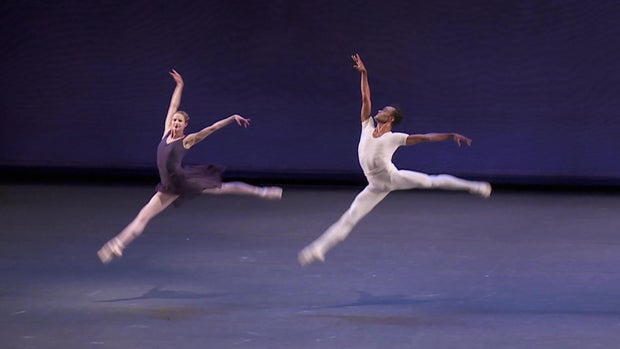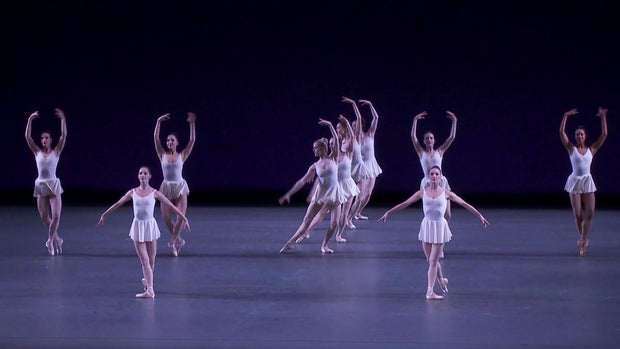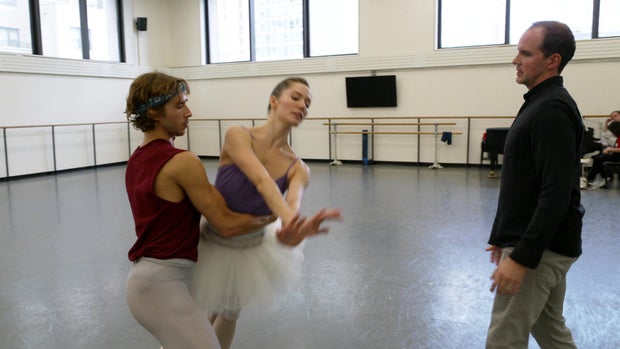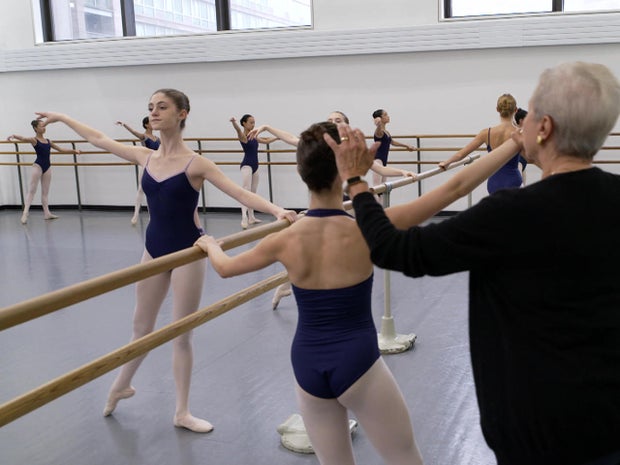Turning seventy-five is a milestone, especially for a ballet company. At three-quarters of a century, New York City Ballet is considered not just one of the best dance companies in the world, but also the foundation of ballet in America.
“For all of us that are here, I think we all really would agree this is the top of the top,” said Megan Fairchild, one of New York City Ballet’s principal ballerinas. The company is made up of 90 dancers, and has an unparalleled repertory of more than 500 ballets.
Asked what is different about the way dancers dance at New York City Ballet versus the rest of the world, Fairchild said, “We like to play with the musicality as we dance. There’s just nothing square about it. It’s playful, and it’s alive and spontaneous.”
New York City Ballet
That excitement has been part of the company’s ethos since the curtain first went up in 1948. New York City Ballet was founded by art connoisseur Lincoln Kirsten and choreographer George Balanchine, who wanted to modernize the 15th century art form. “Ballet in America was very young then,” said legendary dancer Suzanne Farrell. “[Balanchine] felt that part of his mission was to educate an audience, because they didn’t know that much about ballet.”
Farrell was one of Balanchine’s muses and masters of his signature fast-paced, athletic ballets, focused less on plot, and more on music and movement.
New York City Ballet
How did audiences respond? “It depended on the audience, but usually they were shocked in a good way,” Farrell said.
Those ballets are now performed internationally, by nearly every ballet company, and are largely considered the barometer for a dancer (or company’s) strength. Farrell said, “You cannot see a Balanchine ballet and go out and not have a major change. It might not be anything you can identify, but you are better for having seen that ballet.”
After George Balanchine’s death in 1983, dancer Peter Martins ran the company for more than three decades, before stepping down amid misconduct allegations, which he denied. Wendy Whelan and Jonathan Stafford have led the company together since 2019.
CBS News
Surviving for a dance company today, Stafford said, is “really hard. As a nonprofit performing arts organization, it feels like you start at zero every single year. You know, you have to bring that audience back, you have to sell the tickets, you have to raise the money. We know we have to constantly keep pushing, working to enhance the company.”
That involves training the next generation at its affiliated school, the School of American Ballet in New York. It also means continuing the company’s tradition of new works by contemporary choreographers, with noteworthy collaborations with artists ranging from Sir Paul McCartney, to Solange Knowles, to Valentino.
CBS News
And who is attending the ballet these days? “Young people,” said Whelan. “Yeah, a lotta young people.”
“For the first time since we’ve been tracking it, our largest single-ticket demographic is age 30 to 39, which is huge,” Stafford said.
Whelan added, “We try to make it fun. There’s always a fresh recipe, and unexpected, and we just want to keep that evolving.”
It’s that evolution, they say, that will keep the art form front-and-center – and New York City Ballet worthy of an encore.
CBS News
For more info:
Story produced by Sara Kugel. Editor: George Pozderec.
See also:
Dance Man: Justin Peck (“Sunday Morning”)
“Nutcracker” ballerinas’ most important accessory: Pointe shoes (“Sunday Morning”)
From 1980: Jacques d’Amboise on teaching dance to children (“Sunday Morning”)
Bringing ballet to special young dancers (“Sunday Morning”)







